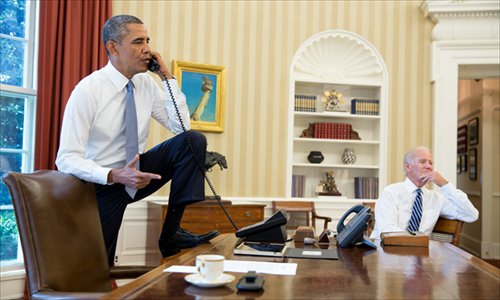Syria mocks Obama ‘retreat’

US President Barack Obama talks on the phone in the Oval Office with Speaker of the US House of Representatives John Boehneron on Saturday, as Vice President Joe Biden listens. Secretary of State John Kerry Sunday said the US has to act, following Obama's Saturday statement that he will ask Congress to authorize military action against Syria, lifting the threat of immediate strikes. Photo: AFP
Syrians were already celebrating an "historic American retreat" on Sunday after US President Barack Obama said he would seek Congress' approval before launching a strike against Syria.
"Obama announced yesterday, directly or through implication, the beginning of the historic American retreat," Syria's official al-Thawra newspaper said in a front-page editorial.
"President Obama was clearly hesitant, disappointed and confused when he spoke yesterday," deputy foreign minister Faisal Muqdad told reporters.
Local people in Damascus began returning to the streets after Obama's speech, which US media described as a "U-turn" on Syria.
US Secretary of State John Kerry voiced confidence on Sunday that Congress "will do what is right" with Obama's request and approve his call for limited US military strikes against Syria.
The Congress will hold a debate and vote over the strike on September 9.
Many Democrats and Republicans are uneasy about intervening in a distant civil war in Syria.
Kerry also told CNN on Sunday that blood and hair sample tests show Syria has used sarin gas in an attack on its people. He said the US has to act.
Ni Feng, deputy director of the Institute of American Studies at the Chinese Academy of Social Sciences, told the Global Times that Obama's decision indicates that he wants Congress to share responsibility in a war against Syria.
"Ending the two wars in Iraq and Afghanistan have been seen as an important political legacy for Obama, forcing him to hesitate in starting another war in Syria," said Ni.
Ren Xiao, the director of the Institute of International Studies at Fudan University, said that dissenting domestic voices and decreasing support from its allies forced Obama to hesitate over the military strike.
Meanwhile, Obama insisted that he reserves the right to strike regardless of Congress' decision, and a White House official said the pause would also allow him time to build international support.
France said Sunday it could not act alone against Syria after the US hesitated over the strike, as it is the last remaining top ally of the US in the Western coalition willing to "punish" Syrian President Bashar al-Assad for an alleged gas attack that killed hundreds of civilians.
Earlier in the week, British PM David Cameron failed to persuade parliament to back action.
Shortly before Obama's remarks, a team of UN inspectors left Syria after spending four days investigating the alleged chemical attacks in the suburbs of Damascus, saying that an analysis of samples would take up to three weeks.
Russia's President Vladimir Putin Saturday said that Obama, a Nobel Peace Prize winner, should consider the potential victims of a military attack against Syria.
Obama is set to fly to St. Petersburg for the G20 summit next week.
"The G20 summit will provide a diplomatic chance for different powers to discuss the situation in Syria," said Ren.
Agencies contributed to this story